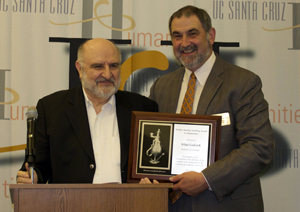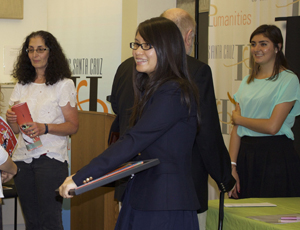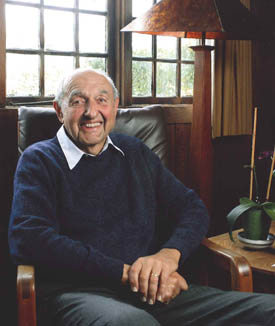Distinguished Professor of Literature Wlad Godzich was presented with the John Dizikes Faculty Teaching Award in Humanities at the Humanities Division’s 2014 Spring Awards Celebration.
Established in 2002 to honor outstanding teaching by humanities faculty, the award is named in honor of one of UCSC’s founding faculty members.
The Dizikes teaching award was designed to celebrate the Humanities faculty's commitment to excellence in teaching and its impact on undergraduate students
But the annual Humanities award comes with an unusual provision. In addition to being honored with a check for $3,000, the winner is entitled to select one undergraduate student to receive a $3,000 scholarship.
Godzich chose Carrie Xiao.
“My intellectual itinerary at UCSC began quite conventionally,” Xiao noted at the awards ceremony. “I was strongly urged--and not a little conditioned by my parents--to declare a major in biochemistry, a gateway to desirable, prestigious and well-remunerated professions in medicine and science."
"The conditioning included such things as daily bedtime stories of the lives of famous scientists, along with trips to the local zoo and what seemed an inevitable recounting and recapitulation of Darwin’s discoveries.”
“My trajectory was limpidly clear,” she added, “but it was derailed by a very simple thing that UCSC insisted upon: general education requirements.”
Xiao soon realized that she was more attracted to the actual lives of the scientists than their discoveries. She also found her classes in history and literature much more stimulating than organic chemistry.
Before she knew it, she was taking courses on colonialism, the Holocaust, the history of the novel, and translation theory.
“I found myself particularly drawn to accounts of human inhumanity toward other human beings—child abuse, domestic violence, torture in all of its forms,” said Xiao. “At the same time, I grew increasingly irritated with the way in which these matters were being treated.”
“Different disciplines, from psychology to history, imposed their own particularized jurisdiction over these matters,” she explained. “Sophisticated distinctions were being drawn, taxonomies elaborated, and the matter was parceled out among intellectual silos that did not communicate with each other. The result was that the voice of the victims was no longer heard.”
Xiao resolved to make the voices of the victims heard and their specific experiences acknowledged. She decided to write her senior thesis based on the premise that all these forms of violence were “part of one whole, the arc of violence and suffering, and that distinctions between domestic, private, public, and state-sponsored forms were ways of masking the horror and giving cover to the perpetrators.”
Xiao is one of many students and colleagues who offered high praise for Professor Godzich’s ability to inspire and engage students over the years, and for creating an inclusive learning environment at UCSC that challenges and encourages all students.
Godzich joined UC Santa Cruz as dean of Humanities in 2000. He came to the campus from the University of Geneva in Switzerland, where he was professor of English and comparative literature, chair of the Emergent Literatures program, and a professor in the university's Graduate Institute of European Studies.
He has also held visiting professorships at the University of Silesia in Poland, the Catholic University of Rio de Janeiro in Brazil, Harvard University, and the University of Zurich.
“As an ethical transaction, teaching is performative, which means that I have to be as aware of the students as I am of the subject matter,” Godzich observed. “The latter can be prepared beforehand, but the engagement with the students occurs in ‘real time’ as we say these days, and it must be carried out in such a way that each and every one of the students feels addressed.”
“Teaching for me is an act--somewhat acrobatic and therefore risky, and always new, and therefore never routine or boring,” he added.





